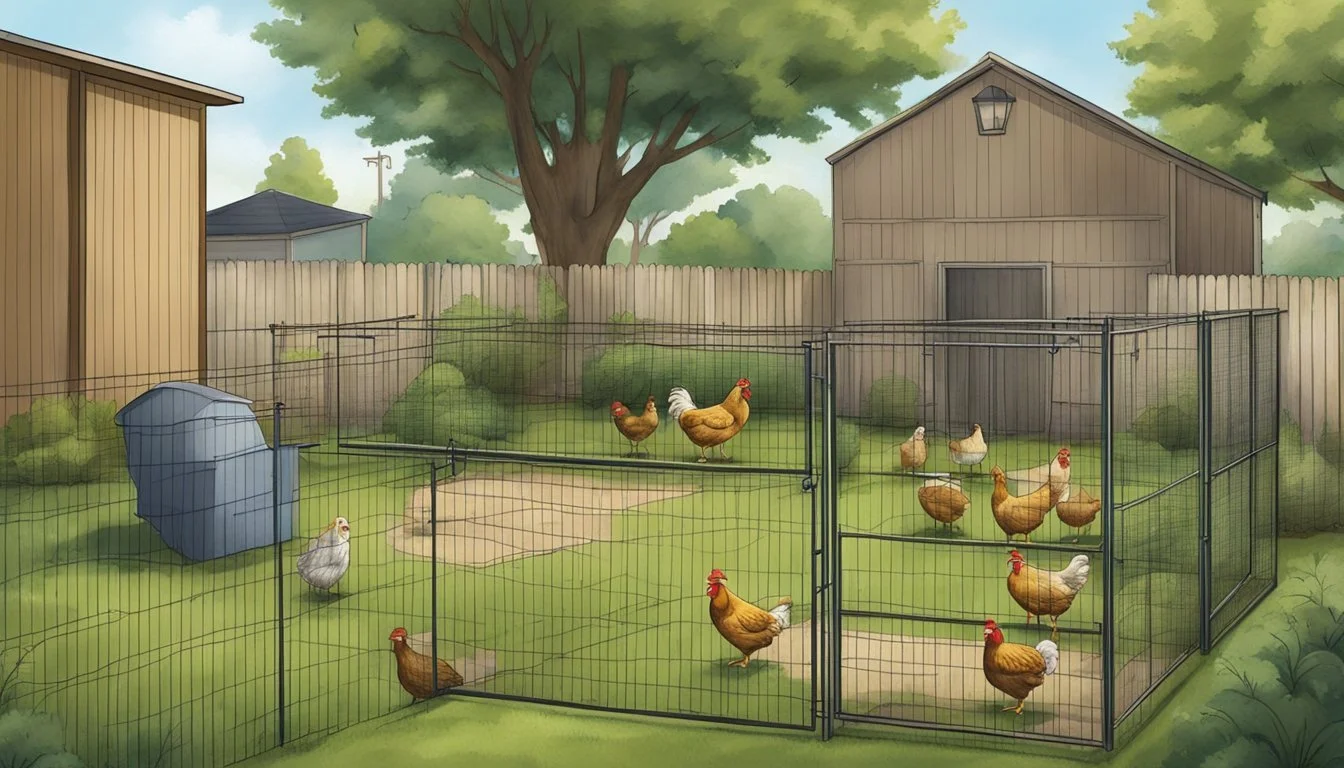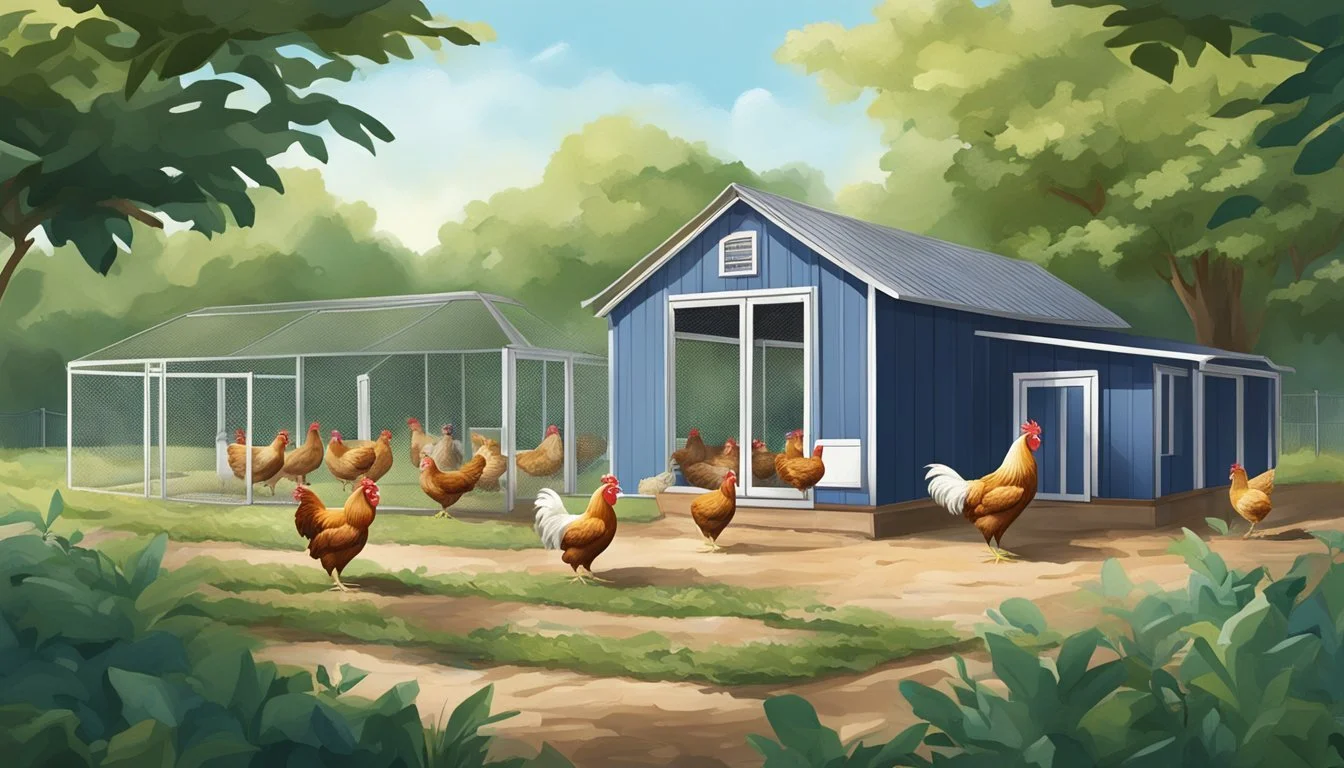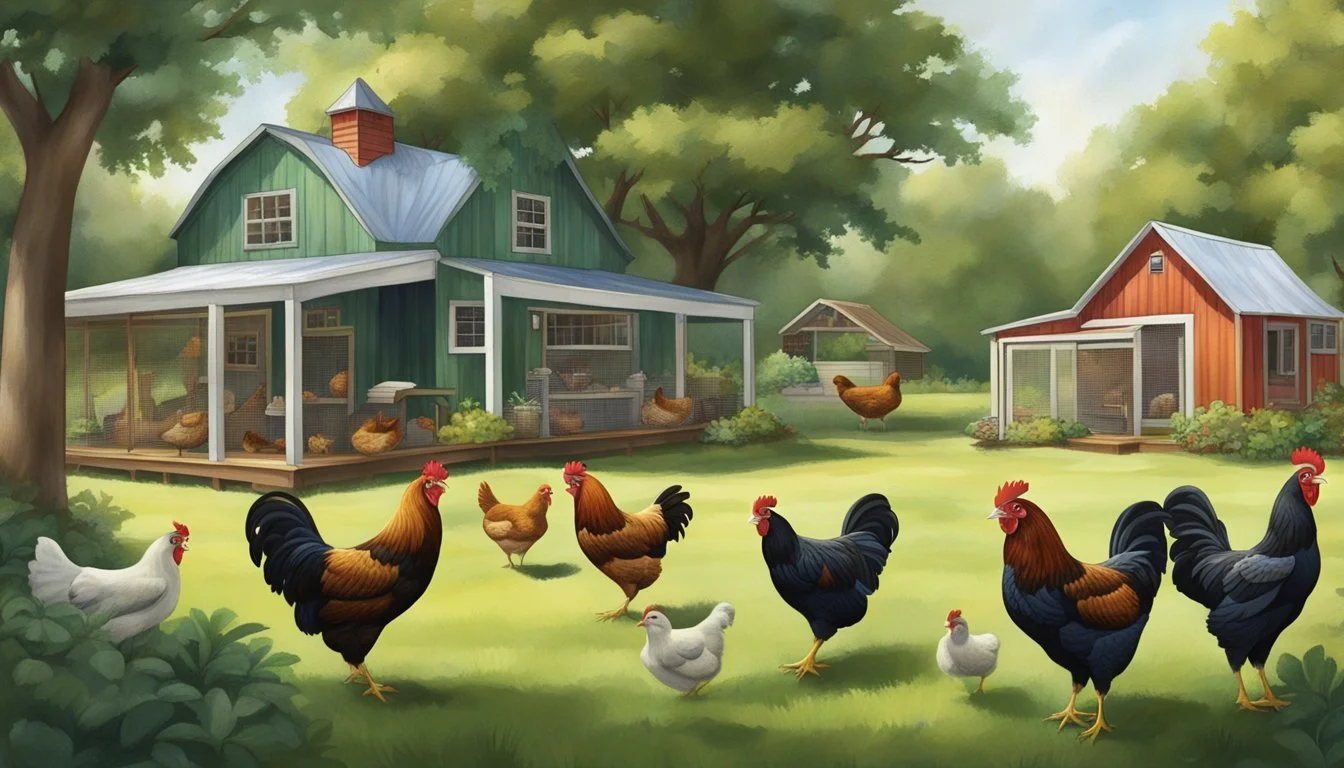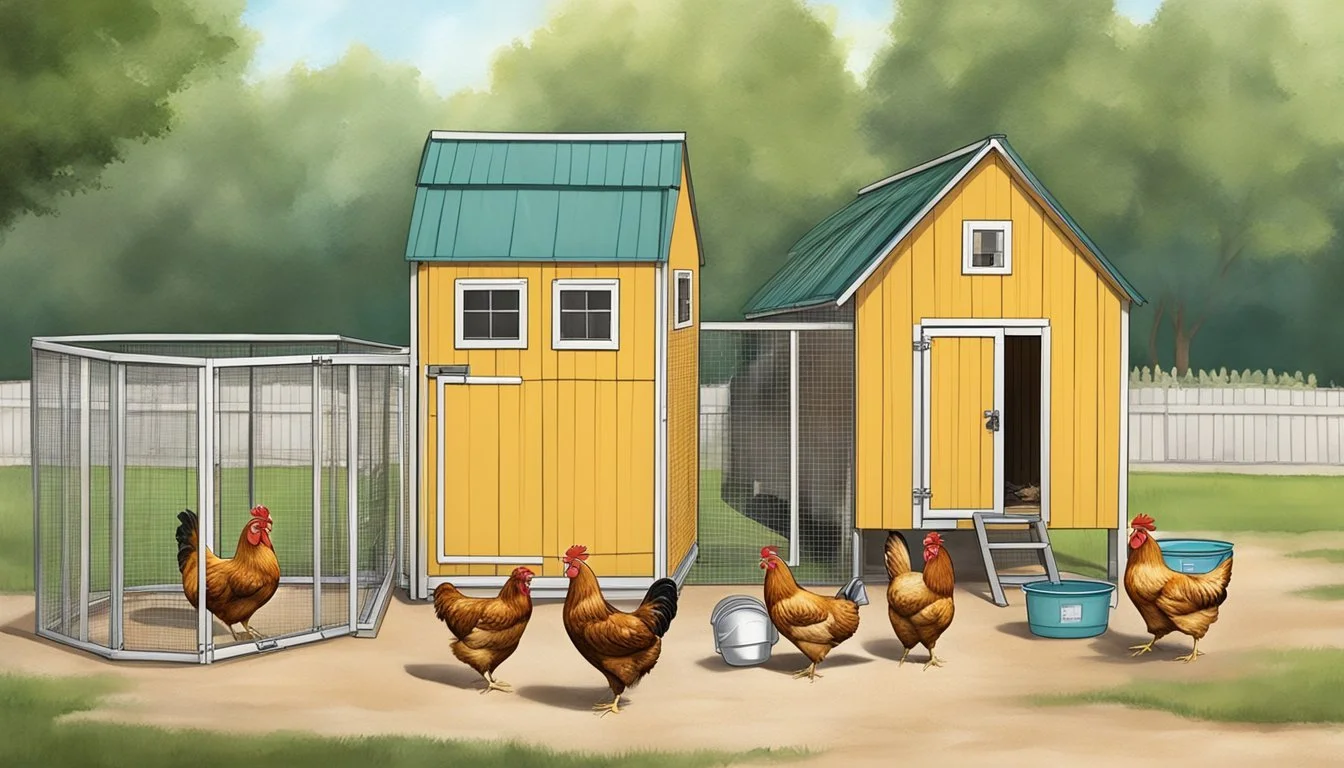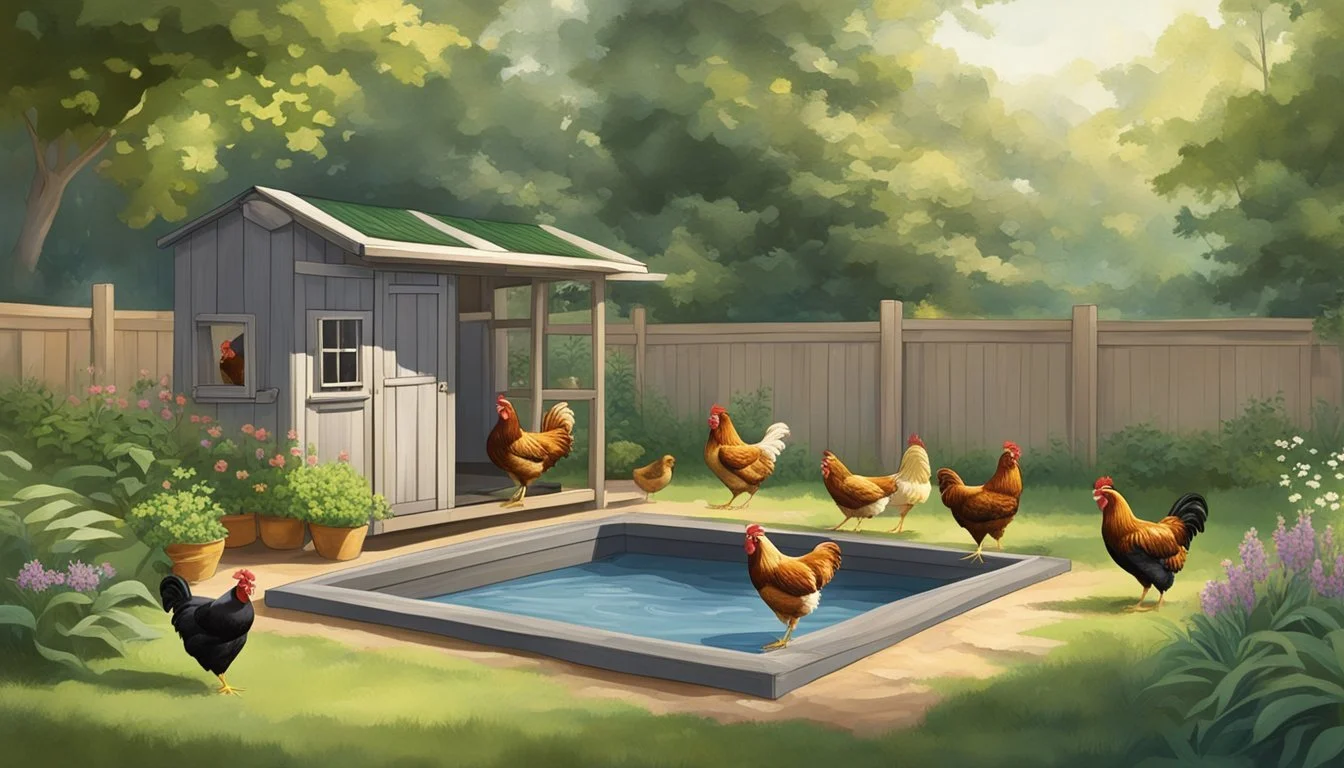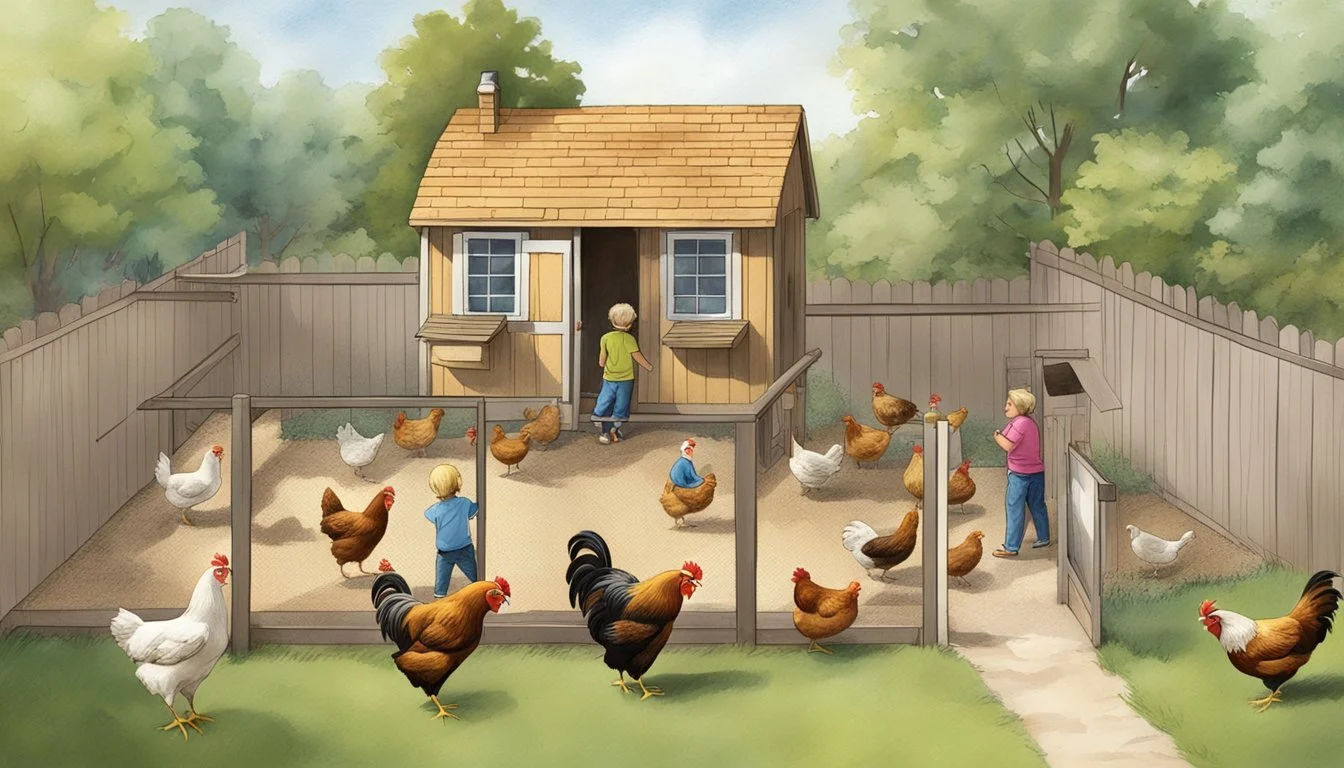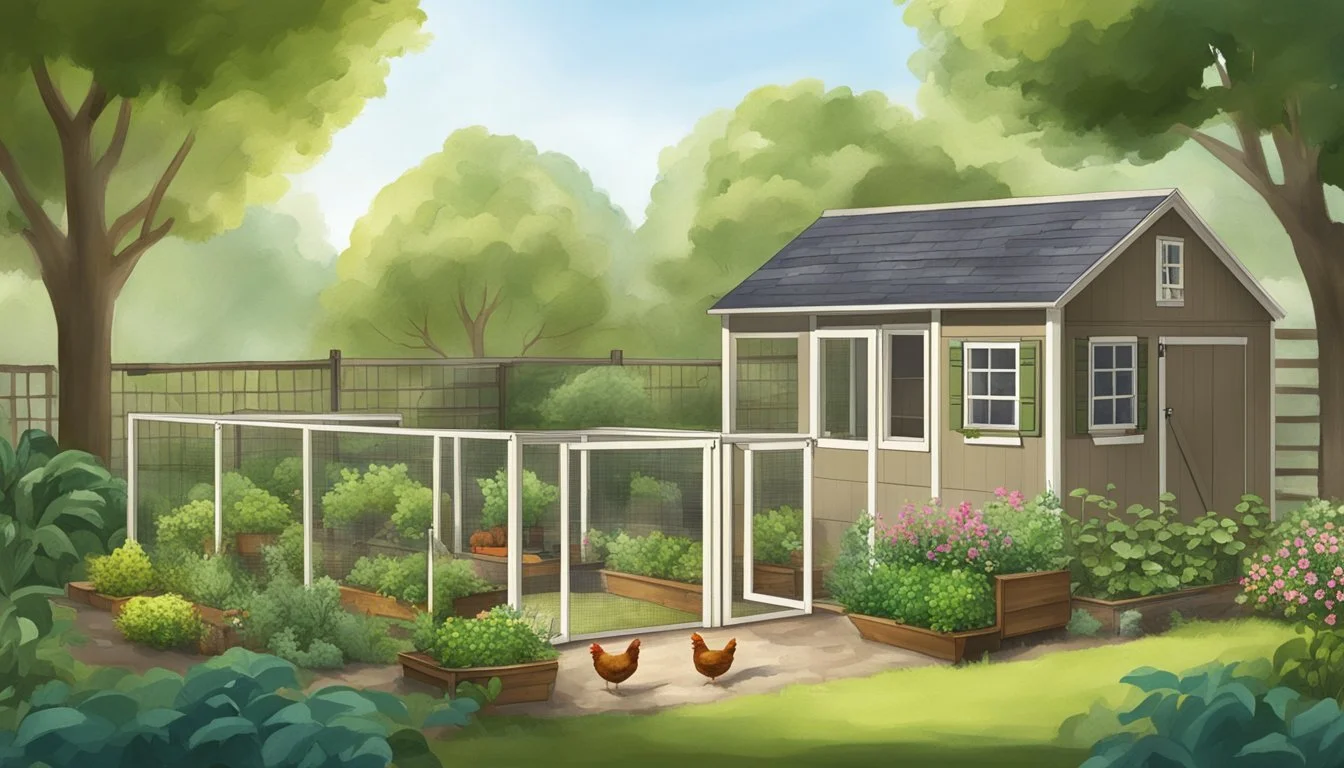Keeping Backyard Chickens in Beaumont, TX
A Starter Guide for Local Enthusiasts
Raising backyard chickens has gained substantial popularity in Beaumont, Texas, aligning with a wider trend across the state. Enthusiasts embrace the practice for its numerous benefits, which include a supply of fresh eggs, natural pest control, and the joy of caring for these animals. In Beaumont, like in many urban areas, prospective poultry owners must navigate local ordinances that govern the keeping of livestock within city limits.
Understanding the specific requirements of Beaumont’s chicken ordinance is crucial for residents who wish to join the urban agriculture movement. The city’s regulations clarify permissible activities and are designed to maintain harmony in densely populated areas. This ensures that the practice of raising chickens benefits both the owners and their neighbors, minimizing potential nuisances such as noise and odors.
In Texas, the approach to backyard chickens varies greatly from one locale to another, reflecting the diversity of the state's communities. While some cities may be more restrictive, Beaumont’s ordinances allow for the keeping of chickens, albeit with certain conditions to ensure public health and animal welfare. As a result, a growing number of residents in Beaumont are discovering the advantages of raising chickens and integrating them into their suburban lifestyles.
Understanding Local Ordinances
When keeping backyard chickens in Beaumont, Texas, residents must be aware of specific local ordinances. These rules are designed to maintain public health and community harmony.
City Regulations and Restrictions
Beaumont's city ordinances stipulate that chickens are permissible within city limits under certain conditions. For instance, the definition of livestock in Beaumont includes chickens and other small animals such as guinea pigs and rabbits. Residents must ensure their coops and pens meet the city's requirements, including proper waste disposal and maintenance to prevent odors and attraction of pests.
Noise and Public Nuisance
While chickens are allowed, it is essential for Beaumont residents to consider the noise ordinance, especially if roosters are part of their flock. Continuous noise that disturbs the peace can be deemed a public nuisance. Hence, chicken keepers should take necessary measures to minimize noise, such as employing soundproofing strategies for coops or choosing not to keep roosters.
Penalties for Non-Compliance
Non-compliance with local ordinances and regulations may result in penalties. Beaumont residents can face fines or other legal consequences if they do not adhere to the specified rules. It's crucial for individuals to be knowledgeable about these ordinances to avoid any infractions that could jeopardize their ability to keep chickens or other small livestock.
Setting Up Your Coop
In Beaumont, Texas, setting up a chicken coop requires careful consideration of location and design to ensure the safety and well-being of the chickens. This includes compliance with local ordinances and protection against predators.
Choosing the Right Location
The right location for a chicken coop in Beaumont needs to satisfy city regulations, which means it should be an enclosed structure that controls noise and odors. The coop should be positioned away from neighboring properties to minimize disturbances. It is also important to choose a well-drained area to prevent standing water and to provide the chickens with a healthy living environment.
Distance from homes: Maintain adequate distance from your home and neighbors to conform to local laws.
Drainage: Select a location that prevents water accumulation.
Sunlight: Ensure the coop receives sunlight, which is vital for the chicken's health.
Coop Design and Security
A well-designed chicken coop is crucial for the health and protection of backyard chickens.
Construction Materials: Use sturdy materials to withstand weather and deter predators.
Fencing: Implement robust fencing, such as hardware cloth, to protect chickens from predators.
Locks: Equip doors and access points with high-quality locks.
Protection from Predators is a must in Beaumont, as it is anywhere:
Elevating the coop off the ground can prevent predators from digging underneath.
Secure perimeters with proper fencing that is dug into the ground to deter burrowing predators.
Regular inspections for vulnerabilities in the structure can prevent unwanted access.
Chicken Breeds and Selection
When selecting chicken breeds for a backyard flock in Beaumont, Texas, one must consider both the climate adaptability of the breeds and their primary use—whether for egg-laying or meat production.
Adaptability to Texas Climate
Texas's climate poses unique challenges to raising chickens, with high temperatures and humidity being prevalent factors. It is crucial to choose chicken breeds that can withstand these conditions. Buff Orpingtons are a viable choice, revered for their docility and heat tolerance, making them well-suited to the Texan weather. Leghorns are another excellent option known for their hardiness and ability to cope with heat, making them a common sight in Texas backyards.
Egg Layers vs. Meat Breeds
Individuals must decide if they intend to keep chickens for fresh eggs or for meat. For those prioritizing egg production, breeds such as Leghorns are prolific layers, offering a steady supply of fresh eggs. These birds lay large, white eggs and are known for their excellent laying capabilities, especially in warmer climates like that of Texas.
Conversely, if one is interested in meat breeds, size and growth rate become significant matters. Jersey Giants are noted for their substantial size, and while they are friendly, they are also a viable option for meat due to their larger build. However, it's essential to note that they may not be as heat tolerant as other breeds, requiring more shade and water in the Texas heat.
Feeding and Nutrition
Proper feeding is crucial for the health and performance of backyard chickens in Beaumont, TX. Chickens require a balanced diet rich in essential nutrients and constant access to clean water to ensure optimal growth and egg production.
Essential Nutrients
Chickens need a variety of nutrients to thrive. Their feed should include:
Proteins: Essential for growth, feather production, and egg development.
Carbohydrates: Provide energy for daily activities and body maintenance.
Fats: A concentrated energy source and vital for absorbing fat-soluble vitamins.
Vitamins: Necessary for immune function, bone health, and blood clotting.
Minerals: Important for skeletal development and eggshell quality.
The feed must also include grit, a material such as crushed granite that chickens ingest into their gizzard to help break down food for digestion.
Water Access
Chickens must always have access to clean, fresh water. Water intake is as important as feed because it aids in digestion, nutrient absorption, and temperature regulation. The water source should be:
Easily accessible: Placed at a height that chickens can comfortably reach.
Clean: Changed daily to prevent the growth of harmful bacteria and algae.
Reliable: Refilled throughout the day, especially during hot weather when water needs increase.
Health and Wellness
Maintaining the health and wellness of backyard chickens in Beaumont, TX, involves proactive disease prevention strategies and diligent routine care. Owners should understand the specific health requirements for chicks, pullets, and adult chickens to ensure their flock thrives in a backyard setting.
Disease Prevention
Biosecurity measures are crucial to protecting backyard chickens from disease. Owners should:
Regularly clean and disinfect coops and equipment.
Control access to chicken areas to prevent contamination.
Implement a vaccination program based on local veterinary recommendations.
Quarantine new birds for at least 30 days before introducing them to the flock to monitor for signs of illness.
Nutrition also plays a key role in disease prevention:
Age Group Type of Feed Notes Chicks Starter feed, high in protein Transition to grower feed at 6-8 weeks. Pullets Grower feed, balanced nutrient ratio Important for supporting rapid growth and development before laying age. Adults Layer feed with calcium Ensures well-formed eggs and maintains bone health.
Monitoring for common poultry diseases such as Marek's disease, avian influenza, and coccidiosis helps owners recognize and respond to health issues early.
Routine Care
Routine care includes daily, weekly, and monthly tasks to support chicken health:
Daily tasks:
Check for signs of illness or injury.
Provide fresh water and proper feed.
Collect eggs to prevent breakage and maintain cleanliness.
Weekly tasks:
Clean and refill bedding.
Inspect and clean feeders and waterers.
Monthly tasks:
Thoroughly clean the coop.
Check for and address parasite infestations, such as mites or lice.
Ensuring pullets and adult chickens receive adequate sunlight and exercise supports immune health. Regular handling and observation make it easier to detect health issues and address them swiftly.
Egg Production and Harvesting
In Beaumont, TX, backyard chicken owners optimize egg production by creating a conducive environment for laying and implement proper methods for collecting and storing eggs.
Nesting Considerations
For efficient egg production, chickens require a comfortable and safe space to lay their eggs. Nesting boxes should be:
Spacious: Ideally 12"x12"x12" to accommodate the hen.
Accessible: Placed between 2-3 feet off the ground.
Private: One box per 4-5 hens to prevent overcrowding.
Secure: Guarded against predators and extreme weather.
Material within the nest box, such as straw or shavings, should be kept clean to ensure that the eggs are not contaminated. Nesting boxes should be positioned in a darker corner of the coop to provide privacy that encourages hatching eggs.
Collecting and Storing Eggs
Regular collection of eggs is crucial for their freshness and to deter hens from becoming broody or starting to peck their eggs.
Frequency: Collect eggs at least once a day.
Hygiene: Clean any dirt off with fine sandpaper or a dry cloth; avoid water if possible, as it can remove the protective bloom.
Storage is key for prolonging an egg's shelf life. Eggs should be stored in a cool, dry place, ideally at a consistent temperature, to maintain quality. Refrigeration is recommended in hotter climates or during summer months in Texas. Properly stored, eggs can remain fresh for several weeks.
Daily Management and Maintenance
Daily management and maintenance are critical to ensure the health and cleanliness of backyard chickens in Beaumont, TX. A well-structured routine is key to keeping the coop in good condition and minimizing odors.
Cleaning Requirements
Regular cleaning is an integral part of keeping backyard chickens. Each morning, they should check and replenish food and water supplies. Nest boxes require daily examination and cleaning to ensure they remain inviting for hens to lay eggs. Bedding in the coop must be inspected and turned daily to keep it dry, as damp bedding becomes a breeding ground for bacteria and pests. Furthermore, it's essential to remove soiled bedding and replace it with fresh materials to maintain a hygienic environment.
Daily Bedding Maintenance:
Turn and fluff bedding to keep it dry.
Remove wet or soiled spots.
Add fresh bedding as needed.
Waste Management
Proper waste management is crucial to control odors and maintain a clean space. The coop and run should be checked for chicken waste daily, and droppings should be collected and disposed of promptly. Regular removal of waste reduces the presence of flies and lessens the likelihood of disease. Composting chicken waste can be an effective method of recycling nutrients back into they backyard garden. Additionally, Beaumont residents should be aware of local ordinances regarding livestock and waste management to ensure compliance with city regulations.
Daily Waste Handling:
Collect and remove droppings.
Utilize a composting system for waste recycling.
Monitor for odor development and address immediately.
Community Relations
When keeping backyard chickens in Beaumont, Texas, the wellbeing of the community and the local ecosystem must be considered. Maintaining good relationships with neighbors and being mindful of the impact on the local environment are key.
Engaging with Neighbors
Keeping chickens in a residential area requires clear communication and cooperation with neighboring residences. Owners should
Inform: Let neighbors know about the intention to keep chickens and address any of their concerns proactively.
Regulations: Adhere strictly to city ordinances, including the permitted number of chickens and housing requirements.
Good neighbor relations might involve:
Sharing egg production with others to foster a sense of community.
Ensuring noise levels are minimized, especially during early morning hours.
Chickens and Local Ecosystem
The presence of chickens can impact the local ecosystem in several ways:
Chickens can help control pest populations by eating common insects and larvae, thus reducing the need for chemical pesticides.
Proper waste management is vital to prevent runoff that could affect local water sources.
Community involvement:
Schools and churches may benefit from educational programs about sustainable living and local food production involving chickens.
Workshops can be organized to educate about the appropriate care and management of backyard flocks to enhance the ecosystem.
Legal Considerations in Texas Cities
In Texas, the legality of keeping backyard chickens varies by city, with specific ordinances and zoning laws governing the practice. It is crucial for residents to check local regulations before starting a backyard flock.
Specific City Ordinances
Beaumont
Requires chickens to be kept in an enclosed structure to mitigate noise and odors.
City contact: Tina Broussard, City Clerk.
City Contact Information Enclosure Requirements Beaumont P.O. Box 3827, Beaumont, TX 77701. Phone: 409.880.3745 Enclosed to contain noise.
Austin, Dallas, Houston, San Antonio, Fort Worth, Plano, Grand Prairie, Mansfield, Arlington, Irving, Laredo, Lewisville, Murphy
Have their own set of rules regarding minimum distance an enclosure can be from residences and property lines.
Many require enclosures to maintain cleanliness and avoid nuisances to neighbors.
El Paso, Galveston, Corpus Christi
Regulate the number of chickens allowed and often ban roosters due to noise concerns.
Comparative Analysis
Texas cities exhibit a diverse range of regulations on backyard chickens. For example:
Dallas mandates a minimum distance of 20 feet from the owners' residence and 50 feet from neighboring residences for any chicken enclosures.
Houston has a requirement of 100 feet distance from any neighboring dwelling for keeping chickens.
San Antonio residents may keep up to five chickens without a permit, but they must be in the owner's backyard.
In contrast, cities like Plano and Grand Prairie have more stringent rules, and El Paso has regulations particularly focused on noise control. This variability in regulations underscores the need for prospective chicken keepers to consult their specific city's ordinances.
Additional Livestock and Poultry
In Beaumont, Texas, the integration of backyard chickens with other farm animals has distinct regulations. Understanding these restrictions and guidelines is essential for a lawful and harmonious urban farm setting.
Coexistence with Other Farm Animals
The city's ordinances for keeping various types of livestock detail specific conditions for cohabitation with backyard chickens. For example, larger farm animals such as horses, mules, cattle, sheep, and goats may be allowed under certain circumstances, although specifics are not detailed in the provided information and would need to be confirmed with local regulations.
Restrictions and Guidelines
City ordinances determine strict rules addressing:
Distance: Certain animals, like chickens, must be kept a specific distance from neighboring residences.
Numbers: Limits are often in place for the number of each species residents can keep. For fowl such as ducks, geese, and turkeys, as well as for rabbits, Beaumont residents must refer to local ordinances for precise numbers allowed.
Noise: For instance, roosters may be regulated more stringently than hens due to their potential noise impact on the community.
Fowl and Small Animals:
Roosters: Check local ordinances for restrictions.
Ducks/Geese: Often considered together with chickens in lot size requirements.
Rabbits/Guinea pigs: Usually included in urban livestock regulations, with limits on numbers.
Larger Livestock:
Horses/Sheep/Goats: Allowed under certain conditions, but require confirmation with Beaumont's specific codes.
Cattle/Mules: Likely to have stringent requirements due to their size and needs.
Hogs: Typically subject to strict health and safety regulations due to their impact on the environment and potential to disturb neighbors.
Residents must adhere to these guidelines to ensure the welfare of the animals, maintain community standards, and avoid legal issues.
Encouraging Self-Sufficiency
In Beaumont, Texas, aspiring backyard chicken keepers find that nurturing poultry is a step towards self-sufficiency, a tangible means of securing a personal food supply. Local laws guide residents in maintaining flocks responsibly, without compromising urban harmony. Texas Chicken Laws elucidates that, in incorporated areas, chickens should be housed securely, both to safeguard against predators and to ensure animal welfare.
In Beaumont, urban farmers must adhere to nuanced chicken ordinances that uphold community standards. Hen owners are expected to provide:
Adequate space for exercise
Protection from the elements and predators
Access to clean food and water
Restrictions on Raising Chickens:
Roosters: Many urban areas, including Dallas, prohibit owning roosters due to noise concerns. Beaumont chicken enthusiasts should verify local noise ordinances.
Numbers: In certain jurisdictions, Texas state law dictates a minimum flock size, often to the advantage of the poultry keepers, promoting their right to farm.
Self-sufficiency advocates assert that the ability to raise chickens transcends basic food production; it connotes independence and resilience—qualities illuminated by recent global events. With the cost of commercial eggs rising, the appeal of backyard chickens intensifies. Beaumont's local farmers, such as those at The Giving Field, exemplify successful small-scale egg production. Each hen, on average, contributes approximately one egg daily, underscoring the viability and merit of such endeavors.
Participants in Beaumont's chicken community can harvest fresh eggs—with nutritional benefits surpassing store-bought alternatives—and engage in a more sustainable lifestyle, lessening their environmental footprint. The city's regulations aim to strike a balance, allowing individuals to pursue self-reliance while coexisting within a suburban mosaic.


